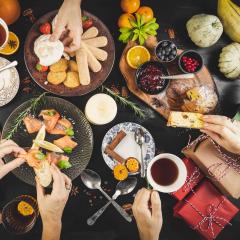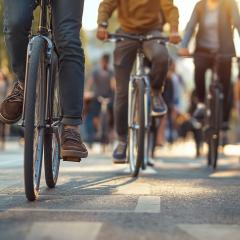Sustainable living is the practice of reducing our demand on natural resources by making sure that we replace what we use to the best of our ability. Sometimes that can mean not choosing to consume a product made using practices that don’t promote sustainability; and sometimes it means changing how we do things.
In 2020, we are being forced to change how we do things. We are working and studying from home. We are not travelling. We are moving about the city less. We are doing more within our immediate suburbs. We are eating in. We are staying put.
Individually, this means that our carbon footprint has been reduced. But these are interesting times for sustainable living practices and, like almost everything related to the current corona virus, how things will play out in the long-term remains uncertain. On a local scale, the sustainability impact of a pandemic is complex—likely to hinge on a variety of changes in the way people carry out their daily lives: from how often we leave our homes to how we travel around our cities to how we do our shopping.
But just because we have no control of some aspects of our life, it doesn’t mean that we have to give up on sustainable living altogether.
Travel and transport
Pollution in some of the world’s major cities has reduced significantly due to a combination of both a slow down in industrial production and reduction in travel.
For example, air traffic halved by mid-March compared with the same time last year. Road traffic in the UK fell by more than 70% in March, emissions in China, the world’s biggest source of carbon, were down about 18% between early February and mid-March. Europe is forecast to see a reduction of around 390m tonnes of CO2. Significant falls are also expected in the US, where passenger vehicle traffic has fallen by nearly 40%. Locally in Australia, data already indicates positive impacts from reduced traffic flows and increased pedestrian traffic as these maps created by the ABC.
While the most common advice remains to limit travel and to conduct meetings and other social events online, where possible, having reliable, affordable choices for that travel is also important.
The term ‘micromobility’ is growing in use and describes small, lightweight transport devices operating at speeds typically below 25 km/h and ideal for trips under 10 km, and includes cycling and walking. Cities such as Mexico City and London that have spent years investing in micromobility infrastructure, such as cycling networks, are currently reaping the benefits as people are currently less inclined to use public transport. The Institute for Transportation and Development Policy states that investment in micromobility planning and infrastructure is important for a city’s overall resilience. Whether it’s a global pandemic, severe storms, poor air quality, or other effects of climate change, cities will continue to have to persevere through disruptions.
Sustainable living tips:
- Opt for virtual meetings and catch ups to avoid travel where possible.
- With fewer cars on the road, try dusting off your bike for your daily commute or trip to the shops via Brisbane’s network of bike paths. Behaviour change is partly habitual. Can confidence and set a routine riding your bike now while there is less traffic and you may be inclined to continue when the restrictions are eased.
- Walking (in groups of two) is another sustainable transport solution. Trying walking to your corner store rather than driving. That way you can combine an essential trip with exercise and you minimise your purchases to only what you can carry!
Energy use
With schools and universities shut around the world and employees being encouraged to work from home where they can, less vehicle traffic, on its own, seems good for the climate. But there’s a potential catch. In Scientific American, Christopher Jones, a climate policy expert at the University of California, Berkeley, says “There’s been a lot of studies on the benefits of telecommuting, and the conclusion usually is ‘it depends,’” Jones said.
If people are spending more time in their homes, they could be using more energy. It depends largely on weather conditions, geography and different family lifestyles. With households working, studying and ‘holidaying’ at home, social services groups are concerned about energy bill shocks in the coming months.
Sustainable living tips:
- Ensure your appliances are not using standby power. The appliance will be warm to the touch if it’s using energy. Switch appliances off at the wall when they're not in use.
- Use power boards with switches to make it easier to turn individual appliances off.
- Use a remote-controlled standby eliminator to turn off your TV and entertainment system.
Single-use plastics
Single-use plastics are in circulation more than ever as people buy disposable items like water bottles and other products like hand sanitizer, tissues and foods that are wrapped in plastic. Restaurants that served food off plates and metal utensils now sell individually wrapped takeaways. Curbside recycling programs have been suspended by some local governments. Some cities are even considering reversing their ban on single-use plastic bags.
While the Queensland Government is currently conducting a survey on a proposal to ban single-use plastics, the ACT Government, which has banned some single-use plastics, has offered a reprieve for businesses during this time, not wanting to place unnecessary regulation on industries such as the hospitality industry that have already been hit hard.
Sustainable living tips:
- If buying takeaway, refuse single-use cutlery if you will be eating at home.
- Continue to make an effort to take your green bags with you when you shop. Make an effort to buy items with the least amount of packaging as possible.
- In Brisbane, Containers for change is still operating, recycling drink containers in exchange for cash. They are monitoring health advice and advise refund point operators how to operate safely. However, check that your local refund point is open before visiting the site. If you’re not certain about visiting a container refund point, consider using a bag drop service. A bag drop is a container refund point where you can drop off bags of eligible containers to an unstaffed container or cage to be counted later.
Online shopping
The current restrictions on movement are driving people to shop online more than ever. However, as well as just helping to limit your travel and contact with others, online shopping is a common way for people to cope with anxiety, according to Josette Freeman, of SMART Recovery, a program that helps people with problematic and addictive behaviours. While it might make you feel better in the short term, in the long term you will have to pay for that habit—both literally and figuratively.
Sustainable living tips
- Buy local where possible. This supports local businesses and reduces the carbon footprint from transporting items over longer distances.
- Patronise the businesses you want to see survive in the future. The financial squeeze is likely to leave bigger companies in better shape than smaller ones.
- Cut degrees of separation between you and your purchases. For example, if you order takeaway, call them directly and pick your food up yourself rather than relying on a third-party app, so that more money goes directly into the profits of the restaurant.
- Think about the working conditions of the people packing and delivering what you buy online. While you cannot be sure what happens on the purchasing path from the warehouse to your door, if you are unsure, think about if your purchase can wait. Do you really need it?
- Create a budget and stick to it. While it might sound boring, you will know exactly how much discretionary cash you have. It will also help you avoid buy now pay later schemes.
Food waste
When the impending threat of quarantine and self-isolation started to circulate, we witnessed the strange phenomenon of people over-buying and hoarding toilet paper. Researchers assured us that hoarding makes people feel secure. In a situation where people feel they have little or no control, stocking up is a relatively cheap action that people can take to make them feel like they are ‘doing something’ when they feel at risk. However, as the instructions from governments moved to limiting movements and trips to shops as much as possible, it led many people also stocking up on perishables food items, such as flour and yeast. Does this mean that that people who have never baked before are suddenly making their own bread?
In some instances, yes. Google’s Coronavirus Search Trends dashboard shows that searches for the term ‘sourdough’ has continued to rise daily since 8 March.
However, not all that hoarded flour will convert to sourdough. A trend that is emerging from the coronavirus crisis is that food waste is increasing exponentially.
Food waste is a serious polluter contributing to the climate crisis. It releases methane as it rots in landfill, and as uneaten food has been resourced through the global food system, it has a hefty carbon footprint attached to it as well. The UN Food and Agricultural Association reports that if food waste was a country it would be the third largest emitter of greenhouse gases (after China and the US).
Given the current uncertainty brought about by the corona virus, making food last for longer can help social distancing by reducing the need for trips to the supermarket, help household finances go that little bit further, while redistributing unwanted food can support those who are self-isolating.
Sustainable living tips:
- Store food properly to make it last longer. For example, potatoes should be stored in a dark cupboard in a cloth bag. Love Food Hate Waste’s A–Z of Food Storage detailed advice for everyday foods to ensure they’re staying fresh for longer.
- Get creative with leftovers. There are many sites and social media accounts popping up with ideas for creating nutritious meals from pantry staples or check out OzHarvest’s Wasty Recipes.
- Plan your meals. Again, while it might seem like a boring tip, planning your meals and shopping from a list will minimise your purchases and also your food waste.
- Share your surplus. Did you accidentally panic-buy three packets of flour? See if your neighbour needs some. Do you have a lemon tree that is overproducing? Leave a basket on the footpaths for people to take.
In some ways it will be more difficult to embrace sustainable living at the moment; in some ways it will be easier. However, it is important that, where you can, to continue to favour the principles of sustainable living.
References
Burnside, N and Byrne, E. (2020) ‘Coronavirus is changing the way we recycle waste and it's not all bad news’, ABC, 13 April.
Flaccus, G. (2020) ‘Coronavirus fears spur cities to reverse hard-fought bans on single-use plastic’ Fortune, 8 April.
Harvey, C. (2020) ‘How the Coronavirus Pandemic Is Affecting CO2 Emissions’, Scientific American, 12 March.
Ibold, S. et al. (2020) ‘The COVID-19 outbreak and implications to sustainable urban mobility—some observations’, Transformative Urban Utility Initiative, 3 April.
Institute for Transportation and Development Policy (2020) ‘As the Impacts of Coronavirus Grow, Micromobility Fills in the Gaps’, 24 March.
Kommenda, N. (2020) ‘How is the coronavirus affecting global air traffic?’, The Guardian, 4 April.
Long, S. (2020) ‘How the coronavirus lockdown will drive up electricity costs for households’, ABC, 12 April.
Lott, M., (2013) ‘UN says that if food waste was a country, it’d be the #3 global greenhouse gas emitter’, Scientific American, 12 September.
Ovide, S. (2020) ‘We are shopping a ton. Let’s be conscientious about it’, New York Times, 13 April.
Remy, M. (2010). ‘What Causes Hoarding?’ Live Science, 18 August.
Rutherford, O. (2020) ‘Four ways to reduce food waste during Corona virus lockdown’, Resource, 2 April.
Turngull, S. (2020) ‘How to control online shopping during the coronavirus pandemic’, ABC Life, 7 April.
Watts, J. and Kommenda, N. (2020) ‘Coronavirus pandemic leading to huge drop in air pollution’, The Guardian, 23 March.
Watts, J. (2020) ‘Climate crisis: in coronavirus lockdown, nature bounces back—but for how long? The Guardian, 10 April.



